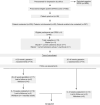PRogram In Support of Moms (PRISM): a pilot group randomized controlled trial of two approaches to improving depression among perinatal women
- PMID: 28994626
- PMCID: PMC5893445
- DOI: 10.1080/0167482X.2017.1383380
PRogram In Support of Moms (PRISM): a pilot group randomized controlled trial of two approaches to improving depression among perinatal women
Abstract
Purpose: This pilot study was designed to inform a larger effectiveness trial by: (1) assessing the feasibility of the PRogram In Support of Moms (PRISM) and our study procedures; and, (2) determining the extent to which PRISM as compared to an active comparison group, the Massachusetts Child Access Psychiatry Program (MCPAP) for Moms alone, improves depression among perinatal women.
Methods: Four practices were randomized to either PRISM or MCPAP for Moms alone, a state-wide telephonic perinatal psychiatry program. PRISM includes MCPAP for Moms plus implementation assistance with local champions, training, and implementation of office prompts and procedures to enhance depression screening, assessment and treatment. Patients with Edinburgh Postnatal Depression Scales (EPDS) ≥ 10 were recruited during pregnancy, and completed the EPDS and a structured interview at baseline and 3-12 weeks' postpartum.
Results: Among MCPAP for Moms alone practices, patients' (n = 9) EPDS scores improved from 15.22 to 10.11 (p = 0.010), whereas in PRISM practices patients' (n = 21) EPDS scores improved from 13.57 to 6.19 (p = 0.001); the between groups difference-of-differences was 2.27 (p = 0.341).
Conclusions: PRISM was beneficial for patients, clinicians, and support staff. Both PRISM and MCPAP for Moms alone improve depression symptom severity and the percentage of women with an EPDS >10. The improvement difference between groups was not statistically significant due to limited power associated with small sample size.
Keywords: Maternal depression; mental health; obstetrics; perinatal metal health; post-natal depression.
Figures
References
-
- Lindahl V, Pearson JL, Colpe L. Prevalence of suicidality during pregnancy and the postpartum. Arch Womens Ment Health. 2005;8:77–87. - PubMed
-
- Flynn HA, Chermack ST. Prenatal alcohol use: the role of lifetime problems with alcohol, drugs, depression, and violence. J Stud Alcohol Drugs. 2008;69:500–509. - PubMed
-
- Britton HL, Gronwaldt V, Britton JR. Maternal postpartum behaviors and mother-infant relationship during the first year of life. J Pediatr. 2001;138:905–909. - PubMed
-
- Forman DR, O’Hara MW, Stuart S, et al. Effective treatment for postpartum depression is not sufficient to improve the developing mother-child relationship. Dev Psychopathol. 2007;19:585–602. - PubMed
Publication types
MeSH terms
Grants and funding
LinkOut - more resources
Full Text Sources
Other Literature Sources
Medical



